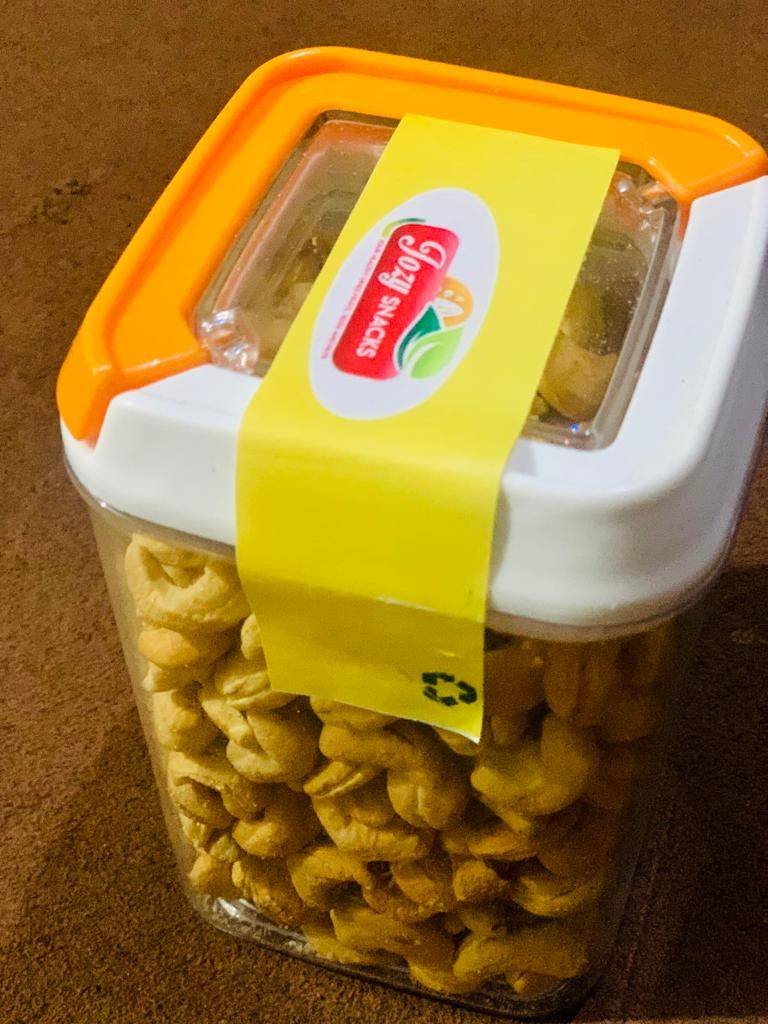Hot!
Extending shelf life of perishable fruits, solving PHLs …The birth of Jozy Snacks

● Ms Josephine Oduro-Boateng
The issue of Post-Harvest Loss (PHL) has been the bane for positioning agriculture as the backbone of Ghana’s economy.
It has left farmers frustrated since their efforts to produce enough food to ensure Ghana was food sufficient and to boost the local economy has been rendered unproductive.
In Ghana’s quest to find a lasting solution to the problem, several initiatives have been proposed over the years; the most recent is the government’s One District, One Factory (1D1F) initiative which seem to have taken a long nap.
However, some private individuals and entrepreneurs, have taken it upon themselves to be innovative and assist in tackling the PHL concern.

One of such individuals taking the bull by the horn to make something meaningful out of fruits that are highly perishable and prevent PHL is, JODACY PLUS with brand name Jozy Snacks.
Operating from her residence at Spintex in Accra, Ms Josephine Oduro- Boateng who started the business in 2018 with three employees is supplying most shops and supermarkets in Accra with Dried Mango Chips, Dried Pineapple Chips, Coconut Chips, Coconut flakes with Ginger as well as Cashew Nuts and Granola.


The business, however began with the Dried Mango Chips considering the fact that the fruit is usually cheap while in season and very expensive and scarce when out of season.
Jozy Snacks purchases Mangoes from farms in Somanya in the Eastern Region, processes and makes a very delicious snacks that could last on the shelves for years.
The business started in 2018 on a very informal note with the innovative product sold to mostly friends, church members and people in the neighbourhood.
Just after a year when Ms Oduro- Boateng was expecting that the business would take- off and the product to go on sale on a large scale, COVID-19 set in. Unperturbed though, she decided to use the period to push for certification from the Food and Drugs Authority (FDA) and other agencies.
Motivation
She realised after travelling to some villages that when fruits are in season (especially Mangoes), there is a lot of waste on people’s farms.
She had the conviction that dried fruits were the solution to the problem so she purchased a fruit dehydrator at the cost of GH¢6,000 and other items altogether worth, GH¢12,000 to begin the fruit-drying business.
Now she could boast of a good product after going through almost three months of experimentation with the new machines.
It was not long before they had their first contract with Vivo Energy to supply to their shops.
That opened the floodgates for more collaborations to come on board including training from United Nations Industrial Development Organisation (UNIDO) in areas of standards, food safety and management skills as well as costing.
She later secured other partnerships with China Mall, Shell, Exim Bank and other supermarkets and shops where they supply the product.
Capacity
They are currently producing about 1,000 packs of the 100gramme snacks daily and looking forward to expanding with more machines.
Production Process
From the farms, fruits were sorted to remove damaged ones, with the rest stored for ripening for about three days. Then they would be washed three times, cut and arrange into the dehydrator.
They then set the appropriate temperature and allow it to dry, take it out, and make it cool, bag and seal.
Challenges
The main challenge to the company was finding the machine and the technical support since they were not manufactured in Ghana.
Finance, according to Mrs Oduro-Mensah was another huge challenge for the company since there was massive demand for the dried fruits but unable to supply since they do not have the capacity to produce to meet the expected demand.
Another challenge is the fact that accessible funds from banks have very huge interest rates which scares farmers and small businesses away, hence recommending a flexible capital with low interest for young entrepreneurs in agriculture.
Also hindering their successful operations, is the terrible nature of roads in the country which has huge effect on vehicles and affecting the movement of produce from farms to the factory.
The high cost of power (electricity) could also not be left out of the equation as it is having a huge toll on the business.
Education
A product of the University of Ghana who studied Business Administration and majored in Human Resource Management, she surprisingly did not do anything nutrition but naturally love to play with food and combine a lot of things to see the outcome. A pure business student.
Work
She worked with few private companies but now with the Ghana Revenue Authority as a Revenue Officer, Operations.
The fruit-drying business, is however her side business production is usually done in the evening after closing from GRA.
Hobbies
Writing and being creative, she loves music, sings a lot and even attempted being a musician in the past.
Family
The 46-year-old is a single mother of two teenagers (16 and 19). “I’ll go all length to ensure that the children are taken care off,” she said.
Future
In the next five to 10 years, she wants to employ a lot of people, expand the business and export to other countries. The business would also become an institution where people learn to reproduce what she does.
Quote
Her favourite quote is ‘we are too poor to relax’. She realised that most people especially the youth are struggling financially yet, comfortable and do not want to fight their way out of poverty; the reason for some vices in the country.“There is so much money in the agriculture value chain that the youth can take advantage of,” she stressed.
Recommendation
She said, the government must begin to look for entrepreneurs like Jozy Snacks. She is of the view that there is no focus believing that agriculture would have saved the country by taking a lot of people out of poverty when properly invested into to generate the required revenue.
The company could produce and export when given the needed financial boost.
For government, there should be clear-cut policies and an area of focus since the future in Agriculture is very bright.
“It is a big deal and we must all come together to make it work. Our challenge now is capacity as we are not able to produce enough to meet the demand. There should be some technical support for local fabricators to build the machines so we could buy them,” she stated.
With the right support from the government and other organisations, she is optimistic that the objective of positioning Agriculture as the backbone of Ghana’s economy would be achieved.
By Michael D. Abayateye
Hot!
Is the “Rev” title biblical?

In many Ghanaian churches, pastors are often introduced as “Reverend” or simply “Rev.”
The title is seen as a mark of respect, yet its biblical basis continues to stir debate.
While some Christians argue that it is a harmless way to honour church leaders, others insist it is unbiblical and should not be used at all.
Those who question the title usually point to the Bible itself. Nowhere in Scripture did Jesus or the apostles use “Reverend” for themselves or for one another.
Instead, they addressed each other as “brother” or “servant.” In Matthew 23, Jesus even warned his followers not to seek titles such as “rabbi” or “father,” teaching that all believers are equal under one God.
Critics also note that Psalm 111:9 describes God’s name alone as “holy and reverend” in the King James Bible.
To them, this means the word should be reserved for God, not for human beings. Others go further, citing Job 32, which cautions against giving flattering titles to men.
For such voices, the modern use of “Reverend” risks elevating pastors beyond what the Bible prescribes.
On the other hand, defenders of the title argue that it is not meant to replace God’s reverence but simply to acknowledge a minister’s role.
In many churches, “Reverend” is given to ordained ministers who have undergone training, much like the way a doctor is addressed as “Dr.”
The Bible itself, they point out, encourages believers to honour their leaders, with 1 Timothy 5:17 stating that elders who direct the affairs of the church well are “worthy of double honour.”
In this sense, the title is seen as a formal courtesy rather than a theological statement.
Supporters remind critics that Christianity does not operate in a vacuum but within cultural settings.
In Ghanaian society, respect for elders and authority is central to social order. Just as chiefs are addressed with titles such as “Nana” or “Togbe,” many Christians believe it is fitting to extend a similar courtesy to church leaders.
In their view, calling a pastor “Reverend” reflects Ghanaian values of honour and respect, and does not amount to worshipping a human being.
Yet the debate is far from settled. Some argue that the title has been abused, with individuals presenting themselves as “Reverend” without any proper training or accountability.
Calls have even been made for the regulation of church titles to prevent confusion and protect the credibility of ministry. Others, however, see no harm in its continued use, so long as it is not taken beyond what Scripture allows.
At the heart of the matter lies a bigger question: should Christians stick strictly to biblical language when addressing their leaders, or is it acceptable to adapt titles as society evolves?
The conversation is not just theological but cultural, touching on how Ghana balances respect for tradition with the authority of Scripture.
The debate over the “Rev” title is therefore not one with easy answers. What is clear, however, is that it forces us to reflect on how we show honour, how we interpret the Bible, and how faith interacts with our cultural practices.
As the discussion continues in church pews and on social platforms, we ask you: should pastors and ministers be called “Reverend,” or should Christians abandon the title altogether?
By: Jacob Aggrey
Hot!
Police confirm arrest of two suspects in Asankrangwa murder case

The Western Central Regional Police Command has confirmed the arrest of two men in connection with the fatal stabbing of a 20-year-old man at the Asankrangwa Education Area on Sunday, August 17, 2025.
In a statement signed by the Head of the Public Affairs Unit, ASP Beatrice Turkson, the police said preliminary investigations revealed that the deceased was chased and stabbed multiple times by a group of people.
The incident is believed to have stemmed from a misunderstanding between the deceased and one of the suspects, identified as 36-year-old Kwasi Opong.
According to the police, swift action led to the arrest of Opong and another suspect, 23-year-old William Francis Osei. Both are currently in custody assisting with investigations, while efforts are underway to apprehend another suspect who is still on the run.
The police noted that the body of the deceased has been deposited at the Asankrangwa Catholic Hospital morgue for preservation and autopsy.
“The Command assures the public that all persons connected to this heinous crime will be brought to justice,” the statement said.
The police appealed to the public to provide any information that could assist in the ongoing investigations.
By: Jacob Aggrey






